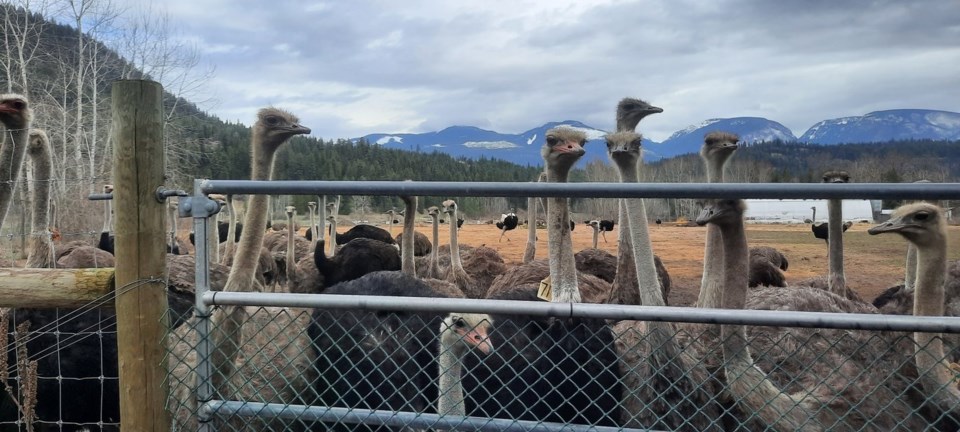A Federal Court judge has denied a bid to prevent the Canadian Food Inspection Agency from culling 400 ostriches on a British Columbia farm that was hit by an avian flu outbreak.
The court on Tuesday rejected two judicial reviews that were filed by Universal Ostrich Farms after the agency ordered the flock killed in December, then denied a bid for an exemption in January.
Katie Pasitney's parents own the farm and she said after the ruling was released that they plan "to fight this legally as far as we can go."
She said they were inviting supporters to come to the farm in Edgewood in southeastern B.C. and show "kindness, peacefulness and love" in protest of the cull, adding the Canadian Food Inspection Agency had the "full authority … to come in whenever they want."
Pasitney said the agency had given no indication when culling might begin.
"They're not gonna make it a public topic because they don't want everybody to know. We have thousands of people behind us," she said.
The Canadian Food Inspection Agency did not immediately provide comment on the court ruling Tuesday.
The plight of the ostrich farm has spurred street protests and a social-media campaign to "Save Our Ostriches," with activists decrying government overreach with the agency's decision to kill the birds.
The farm got an injunction to delay the cull pending its court case, but Federal Court Justice Russel Zinn ruled Tuesday that the agency's decisions were both reasonable and procedurally fair, while acknowledging the "real and negative impact" on the farm and its owners.
“Beyond the economic loss, the destruction of a long-established ostrich population is also a source of emotional distress, particularly given the decades of work and investment the principals have dedicated to breeding and raising their flock," Zinn wrote. "I have considerable sympathy for them.”
The family that owns Universal Ostrich Farm has said the birds should be saved because they have developed herd immunity to avian flu and could contribute to the fight against the disease, which has resulted in millions of birds being culled in British Columbia and is the subject of worldwide concern about its potential to result in a human pandemic.
Zinn's ruling said "courts generally stay out of scientific debates," and could only rule on the reasonableness and fairness of the decisions.
“Courts must also respect the demonstrated scientific and technical expertise of administrative agencies,” the judgment says. “When Parliament leaves technical or scientific assessments to specialized administrative bodies, it signals that those bodies, not the courts, are best positioned to make judgments on complex, expertise-driven matters.”
The owners of the farm said ostriches that survived the flu have recovered and are happy and healthy.
But Zinn found the disposal notice and denial of the farm’s exemption happened in December 2024 and January 2025, and the court can't consider evidence that wasn’t available when those decisions were made.
He said the court "would be faulting decision-makers for lacking a crystal ball.”
“This court cannot consider 'new' evidence, such as the current health status of the ostriches, recent test results or updated scientific developments,” the ruling says.
Zinn said the farm and the agency's competing scientific submissions invited the court to referee "a contest over whose science on the virus in question is 'better' and therefore whose preferred animal and public health policy is 'wiser.'"
Zinn said the court couldn't decide such a contest because it would put the decision beyond the scope of a judicial review focused on determining reasonableness, and "effectively make this court an academy of science and an arbiter of truth in immunology and animal and public health."
The competing expert reports submitted in the case, Zinn ruled, had no weight on his findings.
Parliament empowered the Canadian Food Inspection Agency to face public-health threats such as avian flu, Zinn said, authorizing it to "act decisively making swift decisions with far-reaching consequences, often under conditions of scientific uncertainty. This is a challenging mandate.”
The court ruling notes that the agency's "mandate is protective rather than punitive," and provides compensation to owners whose animals are destroyed, up to $3,000 per animal in the case of ostriches.
More than 8.7 million birds have been culled in B.C. at hundreds of farms, most of them commercial, since the first outbreak of a highly contagious form of the avian flu occurred in the spring of 2022.
Peace River North legislator Jordan Kealy, who supported the attempt to halt the cull, said he was "devastated" by the decision, and the farm was "completely different" to a normal poultry farm that could quickly restock.
"My heart goes out to the family and if people want to reach out to the CFIA and let them know, I honestly believe that there could have been an alternative to this scenario rather than culling and killing all the birds, because they're 30-year-old animals that are not just easily replaced," he said.
B.C. Agriculture and Food Minister Lana Popham said in a statement that while the government's thoughts were with the owners of Universal Ostrich Farms "in what is a very difficult time for them, we respect the decision of the courts, as well as the jurisdiction of the CFIA."
This report by The Canadian Press was first published May 13, 2025.
Darryl Greer, Chuck Chiang and Wolf Depner, The Canadian Press


